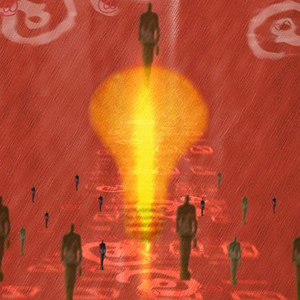 Commentary: African American Scientists and Inventors
Commentary: African American Scientists and Inventors
by Black Kos Editor, Sephius1
Dr. Stephon Alexander asks big questions. How did the space and time that govern our universe come into being? Intrigued at an early age by quantum theory, Einstein's theory of relativity, and string theory, he now works to unify them in his search for a theory of quantum gravity.
"There's a world of phenomena and theories that do very well in making cell phones work," he explains. "But at the same time, other evidence we are calling 'dark matter' is still absolutely mysterious. My discoveries come through calculations as I tease nature into revealing her secrets."
(con't.)
Alexander has long personal experience confronting the unknown. At age eight his family moved from Trinidad to the Bronx in New York City. "My childhood was full of surprises," he remembers. "I learned that you can't always hold on to things; it taught me the idea of embracing the unknown. Our culture tells us to try and control situations. Instead, I've always coped with unexpected events by making up theories about why they may be happening."
After earning a Ph.D. in theoretical physics from Brown University, Alexander completed postdoctoral work at Imperial College in London and the Stanford Linear Accelerator Center. He is now an assistant professor in the Penn State Physics Department.
During a typical day, Alexander and colleagues perform mathematical gymnastics, filling blackboards with diagrams and equations. "That interaction as we deal with a completely open slate is my favorite part," he says. "Highlights come in those moments when I've had a crazy intuitive idea ... explored all kinds of calculations and subtleties ... and then after months of work found that my hunch was absolutely correct. Those moments rarely happen, but when they do, it's amazing."
As Alexander explains, the process is intense. "You can get stuck at any stage and then it's impossible to sleep or think about anything else. For me, playing and composing music can help my mind relax, the way a muscle would relax, and allow me to think more freely."
Alexander notes many parallels between his passions for the tenor saxophone and physics. "Exploring a physics problem is like jazz improvisation—understanding the basic rules and themes lets you take off in spontaneous new directions. Music allows me to understand physics on a simpler, yet deeper level."....Read More
~~~~~~~~~~~~~~~~~~~~~~~~~~~~~~~~~~~~~~~~~~~~~~~~~~~~~
News by dopper0189, Black Kos Managing Editor
~~~~~~~~~~~~~~~~~~~~~~~~~~~~~~~~~~~~~~~~~~~~~~~~~~~~~

~~~~~~~~~~~~~~~~~~~~~~~~~~~~~~~~~~~~~~~~~~~~~~~~~~~~~
Yes progress is happening...slowly. The Grio: Network TV is getting blacker but still has work to do.
~~~~~~~~~~~~~~~~~~~~~~~~~~~~~~~~~~~~~~~~~~~~~~~~~~~~~
Kenya Barris, creator of ABC’s “black-ish,” was motivated to write the comedy about an African-American family’s efforts to honor its heritage in part by the unreality of what he grew up watching on television.
“I saw ‘Friends’ and ‘Seinfeld’ and thought, ‘What part of New York is this?'” recalled Barris, who is black. “It’s not about being diverse. It’s about being true to the world.”
His show comes 15 years after civil rights groups, galvanized by a lineup of new network series almost entirely devoid of minority characters, sought and ultimately won agreements from major broadcasters to put programs on the air that better reflect the nation’s population.
An AP analysis of regular cast members on prime-time comedies and dramas on ABC, CBS, NBC and Fox found progress since then in hiring black actors, but slighted other minorities. Casts at three of the four networks are still whiter than the nation as a whole.

~~~~~~~~~~~~~~~~~~~~~~~~~~~~~~~~~~~~~~~~~~~~~~~~~~~~~
The Sundance Film Festival kicks off today and one of the many films to look for is Stanley Nelson’s documentary, “The Black Panthers: Vanguard of the Revolution.” Shadow and Act: Sundance Trailer Exclusive: Stanley Nelson's Timely 'The Black Panthers: Vanguard of the Revolution'.
~~~~~~~~~~~~~~~~~~~~~~~~~~~~~~~~~~~~~~~~~~~~~~~~~~~~~
Promising a definitive portrait of the Black Panther Party - its rise and fall - acclaimed veteran director Stanley Nelson aims to paint a complete and accurate account of the revolutionary black nationalist organization, in his very timely new documentary "The Black Panthers: Vanguard of the Revolution," a film that should act as a reminder, as well as an education (especially for the uninitiated, unaware of those whose shoulders they stand on).
As Nelson himself states, the rise and fall of the Black Panther Party is a story "that hasn't been told," adding that, "the Panthers have been part of other films, or there have been stories about individual Panthers. But there's never been a really great movie about the Black Panther Party."
The documentary will not only look at the rise and fall of the Party, but also its influence on how African Americans consider themselves today, especially in consideration of recent (and ongoing) collective action within communities nationwide, in response to multiple incidents of police brutality that led to fatalities. A key Panther practice was its monitoring of police officers, and challenges of police brutality.
~~~~~~~~~~~~~~~~~~~~~~~~~~~~~~~~~~~~~~~~~~~~~~~~~~~~~

~~~~~~~~~~~~~~~~~~~~~~~~~~~~~~~~~~~~~~~~~~~~~~~~~~~~~
The nominees for the National Book Critics Circle Awards were announced this week. ColorLines: Jamaican-American Poet Claudia Rankine Among National Book Critics Circle Nominees.
~~~~~~~~~~~~~~~~~~~~~~~~~~~~~~~~~~~~~~~~~~~~~~~~~~~~~
The nominees for the National Book Critics Circle Awards were announced this week, and a few prominent writers of color made the short list. Jamaican-American poet Claudia Rankine was nominated for her collection “Citizen: An American Lyric;” Korean-American novelist Chang-rae Lee was nominated for his latest book, “On Such a Full Sea;” and Guatemalan-American journalist Hector Tobar was nominated for his book, “Deep Down Dark: The Untold Stories of 33 Men Buried in a Chilean Mine, and the Miracle that Set Them Free.”
Other books of note that earned nominations: Thomas Piketty’s “Capital in the Twenty-First Century” and Marilynne Robinson’s novel “Lila.”
Robin Marchant/ Getty Images
~~~~~~~~~~~~~~~~~~~~~~~~~~~~~~~~~~~~~~~~~~~~~~~~~~~~~

~~~~~~~~~~~~~~~~~~~~~~~~~~~~~~~~~~~~~~~~~~~~~~~~~~~~~
Will the current racial tensions in America seep into Cuba and awaken a sleeping giant? Black Cubans say probably not. The Root: Black Cubans: Restoring US Ties Is Cool, but America, Keep Your Hang-Ups About Race at Bay.
~~~~~~~~~~~~~~~~~~~~~~~~~~~~~~~~~~~~~~~~~~~~~~~~~~~~~
t doesn’t matter how much Cuba’s culture changes now that the U.S. has restored diplomatic relations; if you’re waiting for black Cubans to set off some sort of racial revolution, don’t hold your breath.
That’s according to some black Cubans who shared their thoughts on race with The Root in the edited Q&A below.
Omar Diaz is a 28-year-old black Cuban actor living in Miami who immigrated to the U.S. when he was 4 years old. He said that while he’s rooting for a democratic Cuba, he hopes that black Cubans will continue to benefit from the Castro revolution’s decree that Cubans prioritize nationalism over race.
Ruben* is a 52-year-old black photographer and book publisher. He is the only interviewee still living in Cuba. Even though he spoke passionately about racial inequality in Cuba, he explained why he and most black Cubans don’t quite see themselves as Afro-Cuban or black Cuban—just Cuban.
First cousins Elia E. Espuet and Sira Perez, on the other hand, both strongly identify as Afro-Cubans. Both women, ages 63 and 62 respectively, immigrated to the U.S. when they were teenagers in the late 1960s, Fidel Castro having assumed power in 1959. They could easily pass as African Americans, though they vividly remember how they were advised not to, in order to escape the brutality facing black Americans fighting for civil rights. That distinction—Cuba’s kind of racism versus America’s kind of racism—stuck with them. They maintain that black Cubans have it better in some ways on that front.
Georgina Rodriguez, 53—their mulatto, as she describes herself, cousin (who was categorized as “white” in Cuba when she was born)—doesn’t want Americans spewing their “racial framework” and “neoconservatism” all over Cuba. She argues that the former doesn’t account for all of Cuba’s ethnicities, and the latter will only widen the inequality gap.
Afro-Cuban boys playing in Trinidad, Cuba
JPLAVOIE/WIKIMEDIA COMMONS
~~~~~~~~~~~~~~~~~~~~~~~~~~~~~~~~~~~~~~~~~~~~~~~~~~~~~ Five years after a 7.0-earthquake shattered Port-au-Prince and most of its surrounding cities, Haiti is still struggling to rebuild amid a political crisis and disappearing donor funding. Miami Herald: Rebuilding Haiti: Still a work in progress.
~~~~~~~~~~~~~~~~~~~~~~~~~~~~~~~~~~~~~~~~~~~~~~~~~~~~~
The rubble from collapsed buildings and homes that could have filled 4,000 Olympic-size swimming pools is gone. So are the tarps and tin shacks in public spaces, replaced by million dollar facelifts and towering construction cranes.
“There are things I am seeing that I never used to see,” said Jackison Marcellus, 23, looking out across the Champ de Mars, a group of public squares near downtown where he lived for three years under a tent after the Jan. 12, 2010, earthquake.
Five years after the world’s worst natural disaster left more than 300,000 dead and an equal number injured, this shattered nation appears to be in recovery mode: a new Supreme Court is almost finished; new roads and hotels have been built; security and health statistics have improved; and thanks to a generous amount of humanitarian aid from foreign donors, the deluge of people living in tent cities has dropped dramatically.
~~~~~~~~~~~~~~~~~~~~~~~~~~~~~~~~~~~~~~~~~~~~~~~~~~~~~
Welcome to the Black Kos Community Front Porch!
Pull up a chair and sit down a while and enjoy the company.



